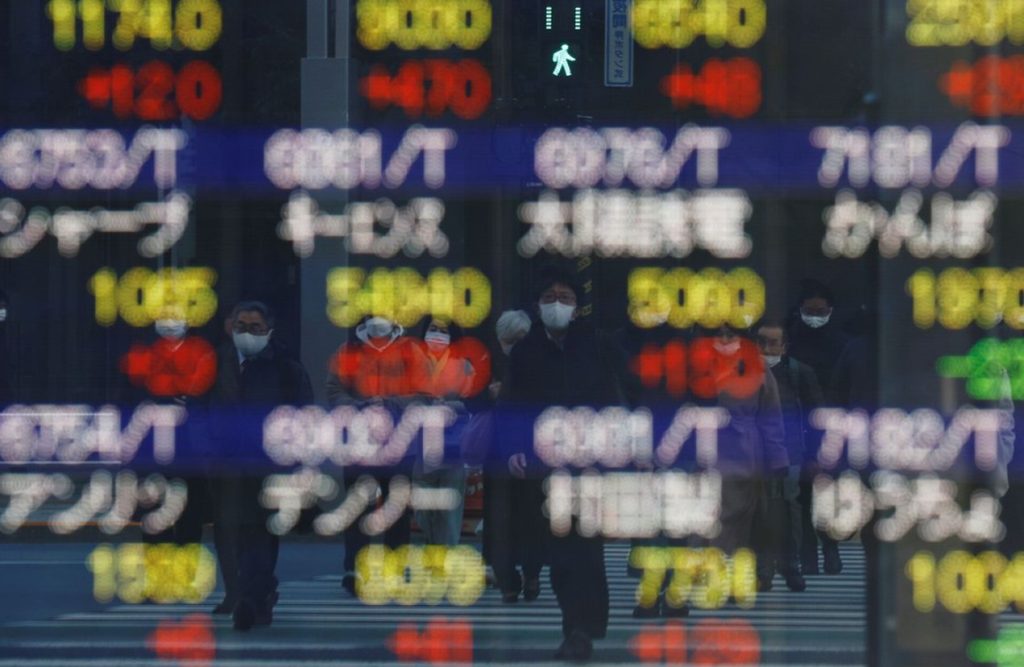
TOKYO, April 6 (Reuters) – Asian share markets slipped on Wednesday as investors faced up to the possibility of aggressive monetary tightening by the U.S. Federal Reserve to fight inflation, while focus was also on new Western sanctions against Russia over its invasion of Ukraine.
U.S. Treasury yields hit multi-year highs and stock markets were red after Fed Governor Lael Brainard said overnight that she expected a combination of interest rate rises and a rapid balance sheet runoff to take U.S. monetary policy to a “more neutral position” later this year.
Japan’s Nikkei (.N225) shed 1.7%, while the MSCI’s broadest index of Asia-Pacific shares outside Japan (.MIAPJ0000PUS) skidded 1.4%.
European markets looked set to open lower too. EUROSTOXX 50 futures eased 0.4% and FTSE futures were flat. S&P500 futures edged down 0.1%.
The focus of investors on Wednesday will be on the release of minutes from the Fed’s last policy meeting, which they will scrutinise for clues on the prospect of a 50-basis point increase at the U.S. central bank’s next meeting in May.
“It’s currently considered an 80% chance the Fed will take that course,” said Kyle Rodda, a market analyst at IG in Melbourne. Investors hadn’t fully priced in such a move, so greater evidence for it may move markets, Rodda added.
“There’s expectation the Fed could hike 50 bps in June too, and if that becomes more likely, then a repricing of those risks could spark another spike in volatility,” he said.
The yield on benchmark 10-year Treasury notes rose to a near three-year high of 2.631% on Wednesday, as a bond sell off after Brainard’s remarks continued.
The U.S. 2-year yield rose to its highest level since January 2019 and the 5-year yield to its highest since December 2018.
Also drawing attention were China’s markets, after data published on Wednesday showed activity in its services sector shrank at the fastest in two years in March as a surge of coronavirus infections restricted mobility and weighed on client demand, a closely watched private sector survey showed.
Hong Kong’s Hang Seng index (.HSI) lost 1.4% on its return from a holiday, moving away from a one-month high reached on Monday, Chinese blue chips (.CSI300) lost 0.46%.
On Tuesday, Chinese authorities extended a COVID-19 lockdown in Shanghai to cover all of the financial centre’s 26 million people despite growing anger over quarantine rules.
The jump in yields following Brainard’s comments also played out in the currency market, providing support to the dollar.
The dollar index hit 99.640 , its highest since late May 2020 in early trade, also supported by a fall in the euro , which hit nearly a month low of $1.0889, hurt by fears more sanctions on Russia would damage Europe’s economy.
The United States and its allies will on Wednesday impose new sanctions on Russian banks and officials and ban new investment there, the White House said.
The greenback was also trading firm against the yen at 123.98 yen given the Bank of Japan’s conviction and repeated action last week to hold the yield on 10-year Japanese government bonds below 0.25%.
The rise in bond yields globally has put pressure on gold, which pays no return.
Spot gold traded down 0.16% at $1,928.8 per ounce.
Oil prices recovered from early losses as the threat of new sanctions on Russia raised supply concerns but there were fears of weaker demand following an increase in U.S. crude stockpiles and Shanghai’s extended lockdown.
U.S. crude was unchanged at $101.96 a barrel. Brent crude was up 0.3% at $106.96 per barrel.























